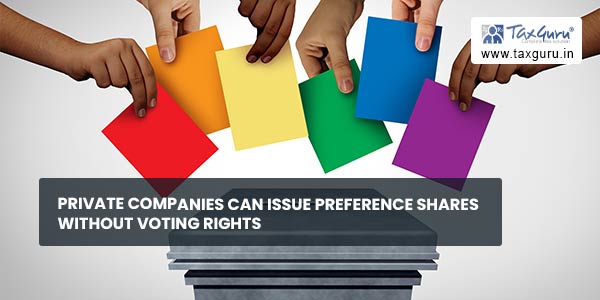While studying about the preference shares, you might have come to the point of how private companies can issue shares without voting rights! So, let’s try to uncurl this question altogether.
As per the Companies Act, 2013, the share capital of a company limited by shares shall be of two kinds, namely: —
(a) Equity share capital;
(i) With voting rights; or
(ii) With differential rights with respect to the dividend, voting, or otherwise in accordance with such rules as may be prescribed; and
(b) Preference share capital;
Why do Companies Issue preference Shares?
Companies issue preference shares as a way to obtain financing without sacrificing voting rights, however, there are certain matters, when their rights are affected then in such cases, preference shareholders get the voting rights, but as per the exemption provided to the private companies under Companies Act, 2013, Private Companies can alter design their MOA or AOA in which they can restrict the voting rights of the Preference Shareholders.

So, let’s start with the provisions of the Companies Act, 2013; as per the provisions of Section 43 of the Companies Act, 2013, preference shareholders of the company, have a right with respect to the payment of dividend, either as a fixed amount or an amount calculated at a fixed rate, which may either be free of or subject to income-tax.
However, In the case of Private Companies, Section 43 of the Companies Act, 2013 shall not apply where memorandum or articles of association of the private company so provides. – Exemption provided via Notification dated 5th June 2015.
Notification dated 5th June 2015, hypothesizes that, in case of Private Company, Company can issue the preference shares without giving them voting rights if AOA or MOA of the Company So provides.
Disclaimer: This article is written merely for informational purposes, and it should not be taken as a piece of legal advice.





